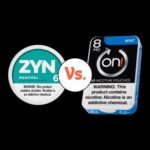While the popularity of Juul vapes is not nearly what it was only a couple years ago when flavor pod sales ran rampant in gas stations, they remain one of the most available vape devices anywhere you are. These sleek, black, flash drive looking things were originally created to help lower the health risks of traditional cigarettes, offering a supposedly “cleaner” alternative, but how safe are they really?
Nicotine: The Biggest Risk
One of the primary concerns with Juul is around the high nicotine content of its proprietary pods. These pods typically contain 5% nicotine, which can be delivered in an intense way with how the Juul is designed. One of the reasons Juul got so popular was for delivering a pretty consistent nicotine buzz to its users.
Nicotine is a highly addictive substance, and its use can lead to long-term dependence. The ease of use and discrete nature of Juul devices make them particularly appealing, but this also poses a significant risk for habitual use.
As with any sort of alternative smoking or cigarette product, if you aren’t already consuming nicotine, it’s best that you don’t start.
Juul vs. Cigarettes: A Detailed Risk Comparison
Chemical Composition
- Cigarettes: Contain tar, carbon monoxide, and over 7,000 chemicals, many of which are toxic.
- Juul: Does not contain tar and has fewer toxic chemicals. However, it includes other potentially harmful substances, like propylene glycol and glycerin, which can form carcinogenic compounds when heated.
Nicotine Content
- Cigarettes: Variable nicotine content, typically around 1.2 to 1.4 mg per cigarette.
- Juul: A single Juul pod can contain as much nicotine as a pack of 20 cigarettes.
Health Impact
- Cigarettes: Well-documented risks including lung cancer, heart disease, stroke, and other serious health issues.
- Juul: While potentially less harmful than cigarettes, the long-term effects are not fully understood. Concerns include respiratory issues, potential cardiovascular risks, and the unknown consequences of inhaling vaporized chemicals.
Addiction Potential
- Cigarettes: High addiction potential due to nicotine and other additives.
- Juul: Similar or higher addiction risk due to high nicotine concentration and ease of use.
Secondhand Smoke vs. Vapor
- Cigarettes: Secondhand smoke is known to be harmful to bystanders.
- Juul: Vapor is less intrusive and potentially less harmful to others, but long-term effects of exposure are unknown.
 Health Risks Associated with Juul
Health Risks Associated with Juul
Respiratory Health
Juul use can impact lung health. The inhalation of vapor can irritate the respiratory system, and there have been reports of lung injuries associated with e-cigarette use. The long-term respiratory consequences are still being studied.
Cardiovascular Health
Nicotine can increase heart rate and blood pressure, posing potential cardiovascular risks. This is true for both Juul and cigarettes.
Addiction and Mental Health
Nicotine addiction is a major concern with Juul use, leading to stress, anxiety, and other mental health issues, particularly in younger users.
Regulatory Responses and Public Health Concerns
In response to growing health concerns around Juul and their attractiveness to younger audiences, regulatory bodies have started to take action against Juul and similar e-cigarette products. This includes restrictions on flavors and marketing practices deemed appealing to minors.
Conclusion: Weighing the Risks
While Juuls may present a less harmful alternative for current cigarette smokers, they are not risk-free. The long-term health effects are still uncertain, and the high nicotine content poses a significant risk for addiction and other health issues. It’s essential for users to be aware of these risks and for continued research and regulation to address these concerns.
If you’ve decided that moving to a vape option is right for your lifestyle, consider using Saucey for same day delivery on Juuls and other similar products.


